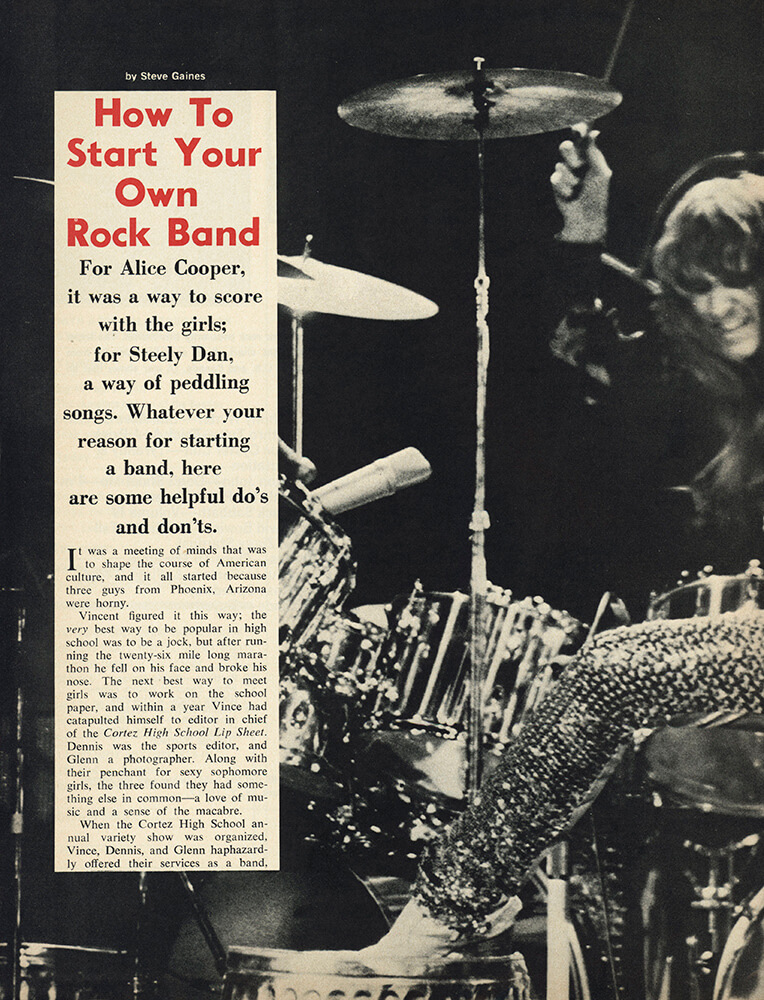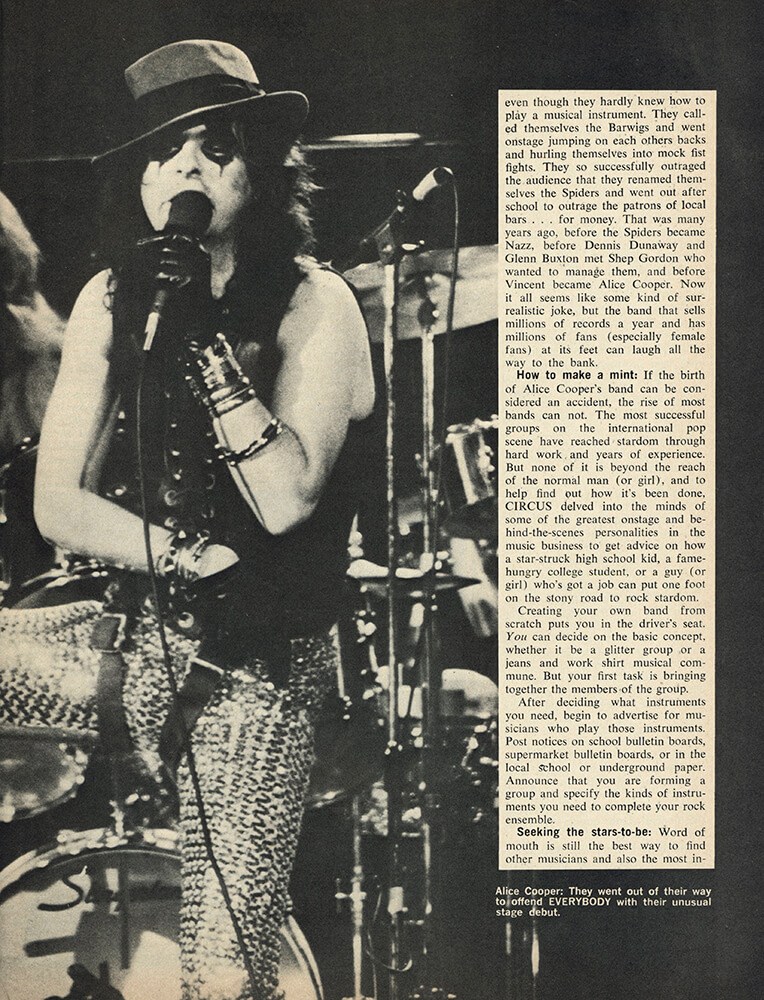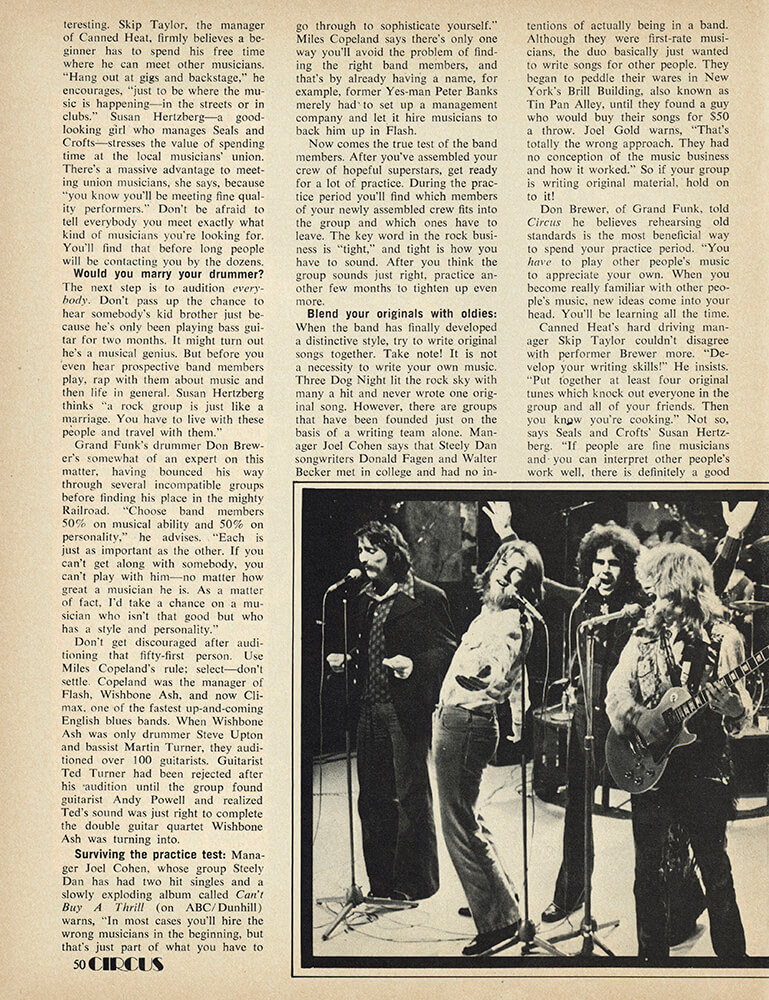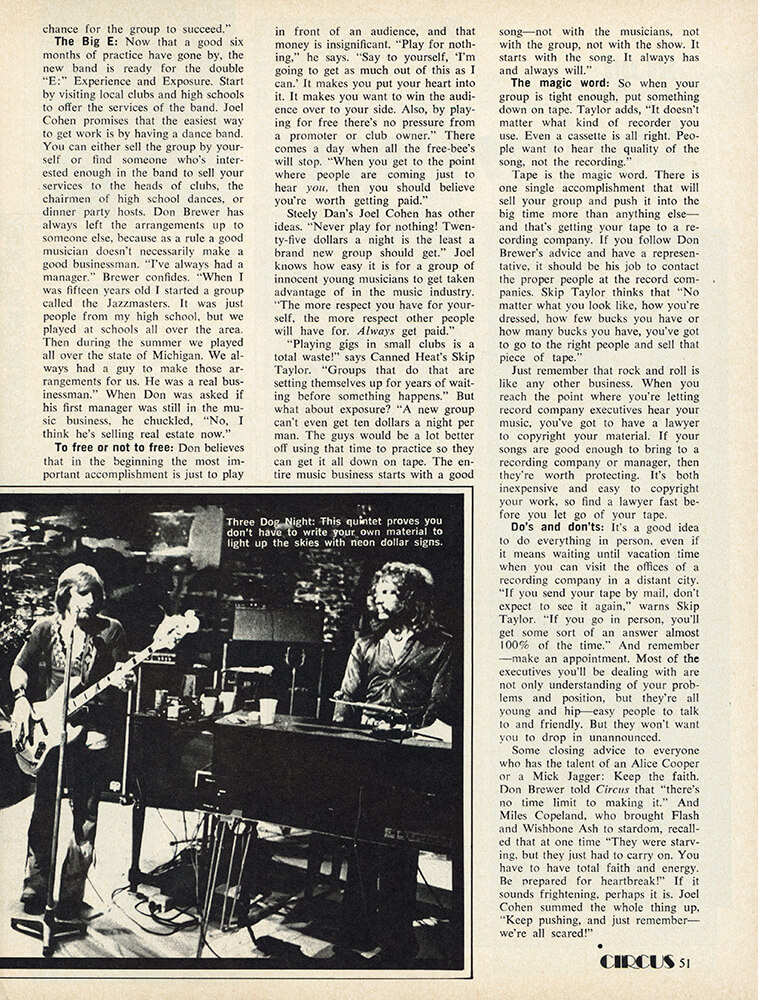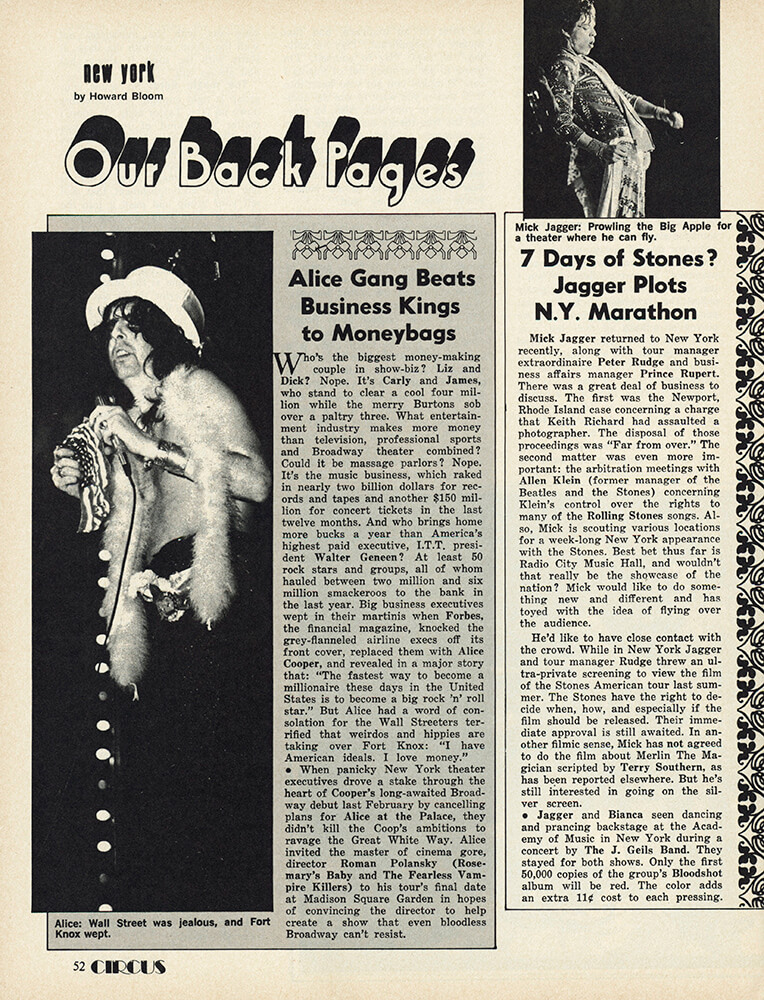Article Database
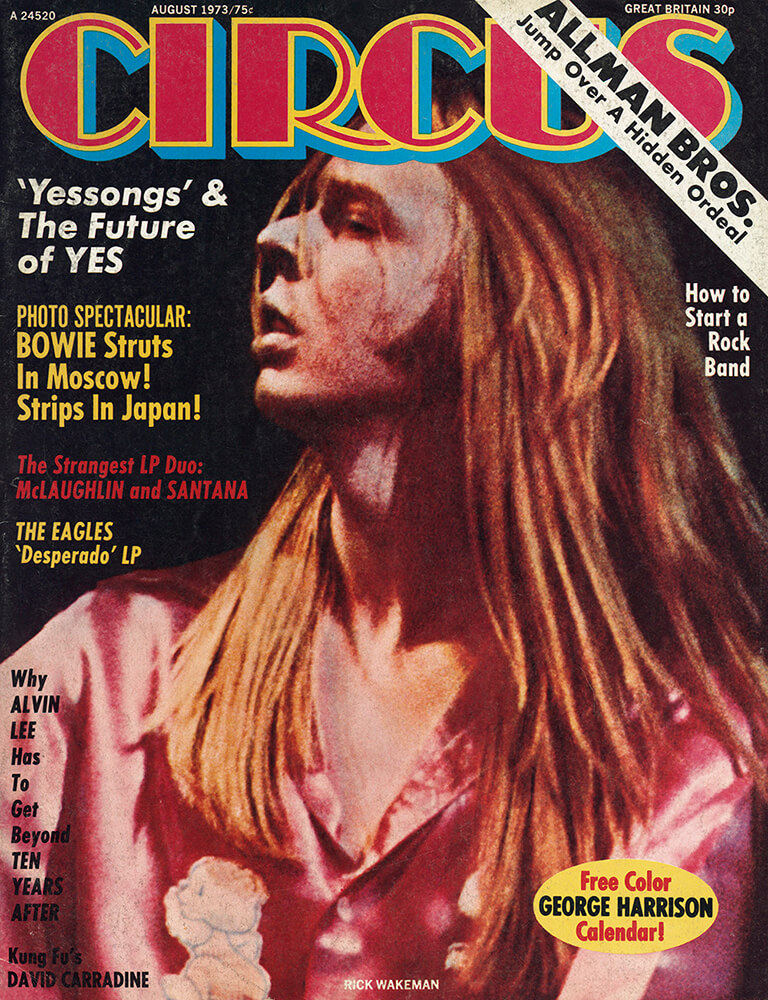
Circus
August 1973
How To Start Your Own Rock Band
For Alice Cooper, it was a way to score with the girls; for Steely Dan, a way of peddling songs. Whatever your reason for starting a hand, here are some helpful do's and don'ts.
Author: Steven Gaines
It was a meeting of minds that was to shape the course of American culture, and it all started because three guys from Phoenix, Arizona were horny.
Vincent figured it this way; the very best way to be popular in high school was to be a jock, but after running the twenty-six mile long marathon he fell on his face and broke his nose. The next best way to meet girls was to work on the school paper, and within a year Vince had catapulted himself to editor in chief of the Cortez High School Tip Sheet. Dennis was the sports editor, and Glen a photographer. Along with their penchant for sexy sophomore girls, the three found they had something else in common — a love of music and a sense of the macabre.
When the Cortez High School annual variety show was organized, Vince, Dennis, and Glen haphazardly offered their services as a band, even though they hardly knew how to play a musical instrument. They called themselves the Earwigs and went onstage jumping on each others backs and hurling themselves into mock fist fights. They so successfully outraged the audience that they renamed themselves the Spiders and went out after school to outrage the patrons of local bars... for money. That was many years ago, before the Spiders became Nazz, before Dennis Dunaway and Glen Buxton met Shep Gordon who wanted to manage them, and before Vincent became Alice Cooper. Now it all seems like some kind of surrealistic joke, but the band that sells millions of records a year and has millions of fans (especially female fans) at its feet can laugh all the way to the bank.
How to make a mint: If the birth of Alice Cooper's band can be considered an accident, the rise of most bands can not. The most successful groups on the international pop scene have reached, stardom through hard work, and years of experience. But none of it is beyond the reach of the normal man ( or girl), and to help find out how it's been done, CIRCUS delved into the minds of some of the greatest onstage and behind-the-scenes personalities in the music business to get advice on how a star-struck high school kid, a fame hungry college student, or a guy (or girl) who's got a job can put one foot on the stony road to rock stardom.
Creating your own band from scratch puts you in the driver's seat. You can decide on the basic concept, whether it be a glitter group or a jeans and work shirt musical commune. But your first task is bringing together the members of the group.
After deciding what instruments you need, begin to advertise for musicians who play those instruments. Post notices on school bulletin boards, supermarket bulletin boards, or in the local school or underground paper. Announce that you are forming a group and specify the kinds of instruments you need to complete your rock ensemble.
Seeking the stars-to-be: Word of mouth is still the best way to find other musicians and also the most interesting. Skip Taylor, the manager of Canned Heat, firmly believes a beginner has to spend his free time where he can meet other musicians. "Hang out at gigs and backstage," he encourages, "just to be where the music is happening — in the streets or in clubs." Susan Hertzberg — a good looking girl who manages Seals and Crofts — stresses the value of spending time at the local musicians' union. There's a massive advantage to meeting union musicians, she says, because "you know you'll be meeting fine quality performers." Don't be afraid to tell everybody you meet exactly what kind of musicians you're looking for. You'll find that before long people will be contacting you by the dozens.
Would you marry your drummer? The next step is to audition everybody. Don't pass up the chance to hear somebody's kid brother just because he's only been playing bass guitar for two months. It might turn out he's a musical genius. But before you even hear prospective band members play, rap with them about music and then life in general. Susan Hertzberg thinks "a rock group is just like a marriage. You have to live with these people and travel with them."
Grand Funk's drummer Don Brewer's somewhat of an expert on this matter, having bounced his way through several incompatible groups before finding his place in the mighty Railroad. "Choose band members 50% on musical ability and 50% on personality," he advises. "Each is just as important as the other. If you can't get along with somebody, you can't play with him — no matter how great a musician he is. As a matter of fact, I'd take a chance on a musician who isn't that good but who has a style and personality."
Don't get discouraged after auditioning that fifty-first person. Use Miles Copeland's rule; select — don't settle. Copeland was the manager of Flash, Wishbone Ash, and now Climax, one of the fastest up-and-coming English blues bands. When Wishbone Ash was only drummer Steve Upton and bassist Martin Turner, they auditioned over 100 guitarists. Guitarist Ted Turner had been rejected after his audition until the group found guitarist Andy Powell and realized Ted's sound was just right to complete the double guitar quartet Wishbone Ash was turning into.
Surviving the practice test: Manager Joel Cohen, whose group Steely Dan has had two hit singles and a slowly exploding album called Can't Buy A Thrill (on ABC/Dunhill) warns, "In most cases you'll hire the wrong musicians in the beginning, but that's just part of what you have to go through to sophisticate yourself." Miles Copeland says there's only one way you'll avoid the problem of finding the right band members, and that's by already having a name, for example, former Yes-man Peter Banks merely had to set up a management company and let it hire musicians to back him up in Flash.
Now comes the true test of the band members. After you've assembled your crew of hopeful superstars, get ready for a lot of practice. During the practice period you'll find which members of your newly assembled crew fits into the group and which ones have to leave. The key word in the rock business is "tight," and tight is how you have to sound. After you think the group sounds just right, practice another few months to tighten up even more.
Blend your originals with oldies: When the band has finally developed a distinctive style, try to write original songs together. Take note! It is not a necessity to write your own music. Three Dog Night lit the rock sky with many a hit and never wrote one original song. However, there are groups that have been founded just on the basis of a writing team alone. Manager Joel Cohen says that Steely Dan songwriters Donald Fagen and Walter Becker met in college and had no intentions of actually being in a band. Although they were first-rate musicians, the duo basically just wanted to write songs for other people. They began to peddle their wares in New York's Brill Building, also known as Tin Pan Alley, until they found a guy who would buy their songs for $50 a throw. Joel Gold warns, "That's totally the wrong approach. They had no conception of the music business and how it worked." So if your group is writing original material, hold on to it!
Don Brewer, of Grand Funk, told Circus he believes rehearsing old standards is the most beneficial way to spend your practice period. "You have to play other people's music to appreciate your own. When you become really familiar with other people's music, new ideas come into your head. You'll be learning all the time.
Canned Heat's hard driving manager Skip Taylor couldn't disagree with performer Brewer more. "Develop your writing skills!" He insists. "Put together at least four original tunes which knock out everyone in the group and all of your friends. Then you know you're cooking." Not so, says Seals and Crofts' Susan Hertzberg. "If people are fine musicians and you can interpret other people's work well, there is definitely a good chance for the group to succeed."
The Big E: Now that a good six months of practice have gone by, the new band is ready for the double "E:" Experience and Exposure. Start by visiting local clubs and high schools to offer the services of the band. Joel Cohen promises that the easiest way to get work is by having a dance band. You can either sell the group by yourself or find someone who's interested enough in the band to sell your services to the heads of clubs, the chairmen of high school dances, or dinner party hosts. Don Brewer has always left the arrangements up to someone else, because as a rule a good musician doesn't necessarily make a good businessman. "I've always had a manager." Brewer confides. "When I was fifteen years old I started a group called the Jazzmasters. It was just people from my high school, but we played at schools all over the area. Then during the summer we played all over the state of Michigan. We always had a guy to make those arrangements for us. He was a real businessman." When Don was asked if his first manager was still in the music business, he chuckled, "No, I think he's selling real estate now."
To free or not to free: Don believes that in the beginning the most important accomplishment is just to play in front of an audience, and that money is insignificant. "Play for nothing," he says. "Say to yourself, 'I'm going to get as much out of this as I can.' It makes you put your heart into it. It makes you want to win the audience over to your side. Also, by playing for free there's no pressure from a promoter or club owner." There comes a day when all the free-bee's will stop. "When you get to the point where people are coming just to hear you, then you should believe you're worth getting paid."
Steely Dan's Joel Cohen has other ideas. "Never play for nothing! Twenty-five dollars a night is the least a brand new group should get." Joel knows how easy it is for a group of innocent young musicians to get taken advantage of in the music industry. "The more respect you have for yourself, the more respect other people will have for. Always get paid."
"Playing gigs in small clubs is a total waste!" says Canned Heat's Skip Taylor. "Groups that do that are setting themselves up for years of waiting before something happens." But what about exposure? "A new group can't even get ten dollars a night per man. The guys would be a lot better off using that time to practice so they can get it all down on tape. The entire music business starts with a good song — not with the musicians, not with the group, not with the show. It starts with the song. It always has and always will."
The magic word: So when your group is tight enough, put something down on tape. Taylor adds, "It doesn't matter what kind of recorder you use. Even a cassette is all right. People want to hear the quality of the song, not the recording."
Tape is the magic word. There is one single accomplishment that will sell your group and push it into the big time more than anything else — and that's getting your tape to a recording company. If you follow Don Brewer's advice and have a representative, it should be his job to contact the proper people at the record companies. Skip Taylor thinks that "No matter what you look like, how you're dressed, how few bucks you have or how many bucks you have, you've got to go to the right people and sell that piece of tape."
Just remember that rock and roll is like any other business. When you reach the point where you're letting record company executives hear your music, you've got to have a lawyer to copyright your material. If your songs are good enough to bring to a recording company or manager, then they're worth protecting. It's both inexpensive and easy to copyright your work, so find a lawyer fast before you let go of your tape.
Do's and don'ts: It's a good idea to do everything in person, even if it means waiting until vacation time when you can visit the offices of a recording company in a distant city. "If you send your tape by mail, don't expect to see it again," warns Skip Taylor. "If you go in person, you'll get some sort of an answer almost 100% of the time." And remember — make an appointment. Most of the executives you'll be dealing with are not only understanding of your problems and position, but they're all young and hip — easy people to talk to and friendly. But they won't want you to drop in unannounced.
Some closing advice to everyone who has the talent of an Alice Cooper or a Mick Jagger: Keep the faith. Don Brewer told Circus that "there's no time limit to making it." And Miles Copeland, who brought Flash and Wishbone Ash to stardom, recalled that at one time "They were starving, but they just had to carry on. You have to have total faith and energy. Be prepared for heartbreak!" If it sounds frightening, perhaps it is. Joel Cohen summed the whole thing up, "Keep pushing, and just remember — we're all scared!"
Our Back Pages
Alice Gang Beats Business Kings to Moneybags
Author: Howard Bloom
Who's the biggest money-making couple in show-biz? Liz and Dick? Nope. It's Carly and James, who stand to clear a cool four million while the merry Burtons sob over a paltry three. What entertainment industry makes more money than television, professional sports and Broadway theater combined? Could it be massage parlors? Nope. It's the music business, which raked in nearly two billion dollars for records and tapes and another $150 million for concert tickets in the last twelve months. And who brings home more bucks a year than America's highest paid executive, I.T.T. president Walter Geneen? At least 50 rock stars and groups, all of whom hauled between two million and six million smackeroos to the bank in the last year. Big business executives wept in their martinis when Forbes, the financial magazine, knocked the grey-flanneled airline execs off its front cover, replaced them with Alice Cooper, and revealed in a major story that: "The fastest way to become a millionaire these days in the United States is to become a big rock 'n' roll star." But Alice had a word of consolation for the Wall Streeters terrified that weirdos and hippies are taking over Fort Knox: "I have American ideals. I love money."
When panicky New York theater executives drove a stake through the heart of Cooper's long-awaited Broadway debut last February by cancelling plans for Alice at the Palace, they didn't kill the Coop's ambitions to ravage the Great White Way. Alice invited the master of cinema gore, director Roman Polansky (Rosemary's Baby and The Fearless Vampire Killers) to his tour's final date at Madison Square Garden in hopes of convincing the director to help create a show that even bloodless Broadway can't resist.




